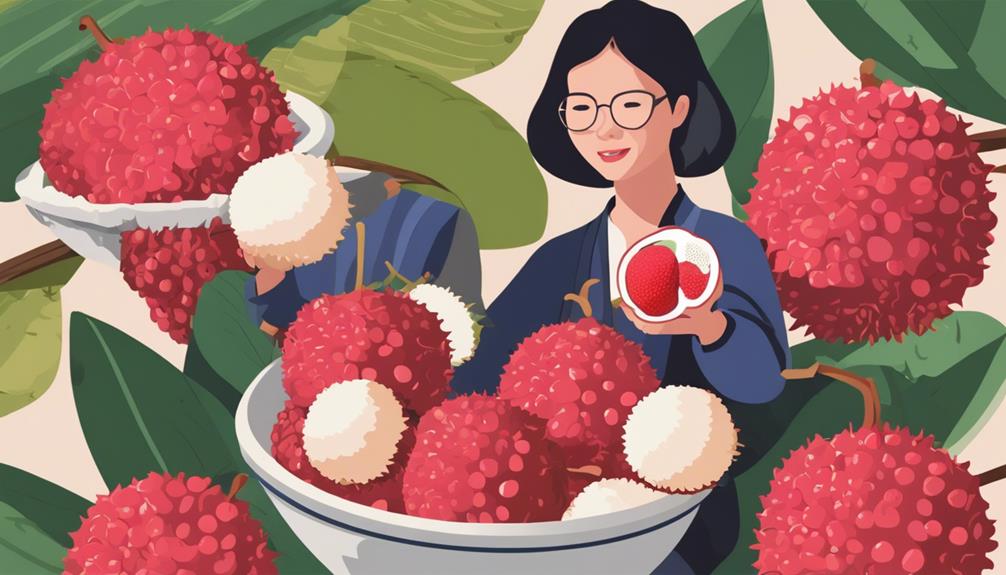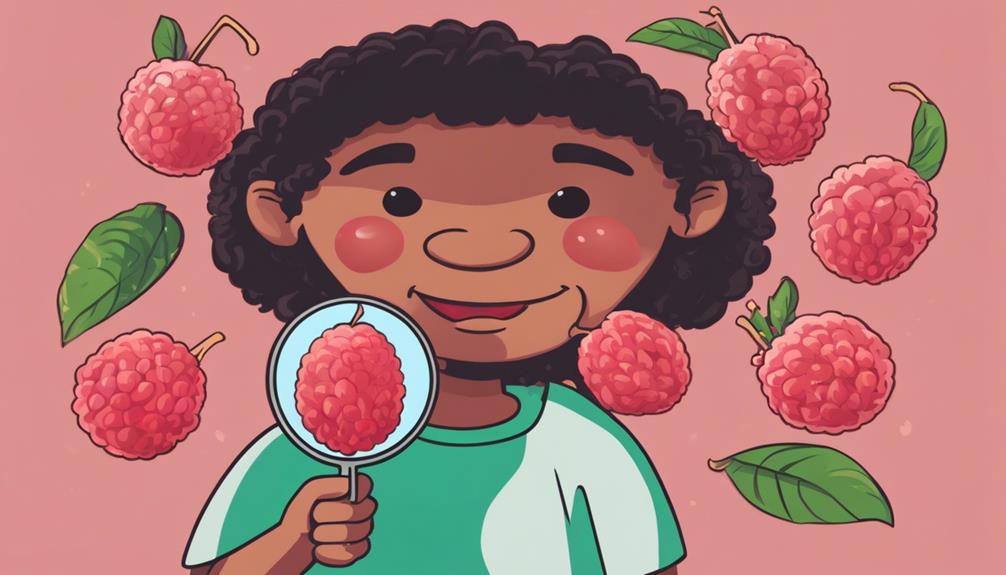When it comes to pronouncing 'Lychee,' you might have encountered different attempts, but let's set the record straight. Start by stressing the first syllable, saying 'lie' and then 'chee,' similar to 'cheese.' But why is this pronunciation essential? Well, mastering the correct way to say 'Lychee' not only shows respect for the fruit but also opens doors to understanding its cultural roots. So, next time you reach for this exotic fruit, remember to pronounce it correctly for a touch of authenticity in your culinary adventures.
Key Takeaways
- Emphasize 'lie' like in falsehood.
- Stress the 'chee' similar to 'cheese'.
- Avoid 'lee-chee' or 'laɪk-ee'.
- Start with 'ly', emphasize 'ch', end with 'ee'.
- Follow tips for mastering subtle sounds.
The Correct Pronunciation of 'Lychee'

To pronounce 'Lychee' correctly, emphasize the first syllable and say 'lie-chee.' The key is to stress the 'lie' part, similar to the word 'lie' as in telling a falsehood, and then smoothly shift into the 'chee' sound, like the end of 'cheese.' This pronunciation captures the essence of the word and is widely accepted in English.
Avoid the common mistake of pronouncing it as 'lee-chee' or 'laɪk-ee,' as these variations don't accurately reflect the original term. By focusing on the correct emphasis and sounds, you can confidently order or discuss lychee without any hesitation.
Remember that getting the pronunciation right not only shows respect for the language but also enhances communication. Embrace the richness of language by mastering the correct pronunciation of 'Lychee' and appreciating its unique flavor and texture.
Common Mispronunciations of 'Lychee'
Commonly mispronounced, 'Lychee' faces variations that deviate from the correct pronunciation. One of the most common mistakes people make is pronouncing it as 'lie-chee' instead of the correct way, 'lee-chee.' The incorrect emphasis on the first syllable leads to this mispronunciation.
Another common error is saying 'luh-chee,' which alters the vowel sound in the first syllable. It's important to remember that the correct pronunciation involves a short 'ee' sound in the first syllable, similar to the word 'see.'
Some individuals also mistakenly say 'lye-chay,' which adds an unnecessary emphasis on the ending sound and completely changes the pronunciation. To avoid these common mispronunciations, focus on saying 'lee-chee' with a quick, light 'ee' sound at the beginning.
The Origin of the Word 'Lychee'

The term 'lychee' originates from the Chinese word 'lìzhī', which translates to 'gift for a joyful life'. The lychee fruit has a rich history dating back over 2,000 years, where it was highly regarded in Chinese culture for its sweetness and symbolic meaning of good fortune and happiness.
To explore further into the origins of the word, let's investigate the table below:
| Language | Word | Translation |
|---|---|---|
| Chinese | 荔枝 | Gift for a joyful life |
| Vietnamese | Vải thiều | Small fruit from the lychee family |
| Thai | ลิ้นจี่ | Royal fruit |
| Hindi | लीची | Nature's candy |
| English | Lychee | Adaptation of the Chinese word |
These translations provide insight into the cultural significance and perceptions of the lychee fruit across different languages, showcasing its value beyond just a tasty treat.
Tips for Pronouncing 'Lychee' Correctly
Mastering the pronunciation of 'lychee' involves paying attention to the subtle sounds within the word. To guarantee you pronounce this delicious fruit correctly, consider the following tips:
- Focus on the beginning: Start by pronouncing the 'ly' sound as you'd in the word 'lie.' This sets the tone for the rest of the word.
- Emphasize the middle: The 'ch' in 'lychee' is pronounced like the 'chee' in 'cheese.' Make sure to give this part of the word the right emphasis.
- End with an 'ee' sound: Finish off by pronouncing the 'ee' sound at the end of the word. This should be a short and crisp sound, similar to saying the letter 'e.'
Regional Variations in Pronouncing 'Lychee'

In different regions, the pronunciation of 'lychee' may vary slightly due to linguistic influences. For example, in some parts of the United States, you might hear it pronounced as 'lie-chee' with the emphasis on the first syllable, while in the United Kingdom, it could be more commonly pronounced as 'lee-chee' with the emphasis on the second syllable.
In Australia and New Zealand, it isn't uncommon to hear it pronounced as 'litch-ee,' emphasizing the 't' sound in the middle. In Asian countries like China and Taiwan where the fruit originates, the pronunciation is closer to 'lee-chee' or 'lee-chay' due to the original Cantonese pronunciation.
These variations are influenced by factors such as historical usage, language evolution, and regional accents.
Regardless of how you pronounce it, the delightful taste of this tropical fruit remains the same across the globe.
Fun Facts About the Lychee Fruit
Delight in discovering intriguing facts about the lychee fruit that will enhance your appreciation for this tropical delight.
- The lychee fruit is a symbol of good luck, happiness, and romance in Chinese culture.
- Lychees are packed with Vitamin C, making them a great boost for your immune system.
- The lychee tree is an evergreen that can grow up to 40 feet tall and has beautiful, leathery leaves.
These fun facts about the lychee fruit showcase not only its cultural significance but also its nutritional value and the beauty of the tree itself.
Next time you enjoy a juicy lychee, remember the symbolism behind it, the health benefits it offers, and the impressive stature of the tree that bears this delicious fruit.
Practice Makes Perfect: Pronunciation Exercises

Enhance your pronunciation skills through consistent practice with these helpful exercises. To start, focus on mastering the correct pronunciation of the word 'lychee.' Repeat the word slowly, breaking it down into syllables: 'lie-chee.' Pay attention to the emphasis on the first syllable and the soft ending sound. Practice saying it aloud several times until you feel comfortable with the pronunciation.
Next, challenge yourself by practicing tongue twisters that include similar sounds to 'lychee.' For example, try saying, 'She sells seashells by the seashore' multiple times to work on your enunciation and clarity. This will help you improve your overall pronunciation skills and make saying words like 'lychee' easier.
Record yourself saying 'lychee' and listen to the recording. Pay attention to any areas where you might stumble or mispronounce the word. By identifying these areas, you can focus on them during your practice sessions and gradually improve your pronunciation.
Conclusion
Now that you know how to correctly pronounce 'Lychee', remember to emphasize the first syllable and avoid common mispronunciations.
Understanding the origin of the word and practicing the correct pronunciation will help you appreciate the cultural significance of this exotic fruit.
Keep practicing to master the subtle sounds and share your knowledge with others.
Enjoy the sweet and fragrant taste of 'Lychee' with confidence!